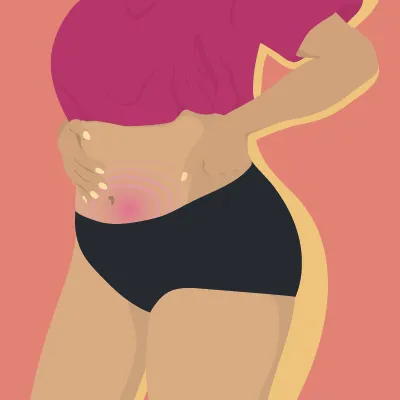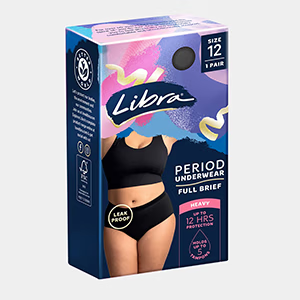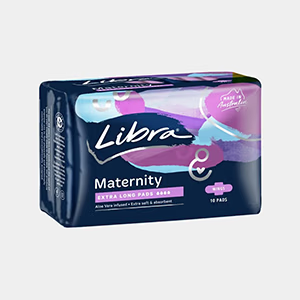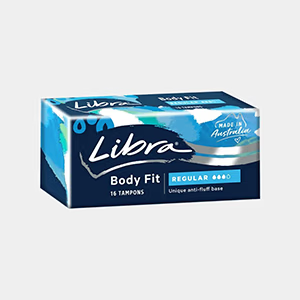Oct 26, 2021
Spotting or period? Differences, causes and how to deal with it
You’re going about your day, when you unexpectedly notice a teeny bit of blood down below… ugh! It’s not that time of month, so what gives?! While spotting can be kind of annoying (especially when you’re rocking your cutest undies), rest assured that it’s common, easily manageable, and not usually a cause for concern. Scroll on for more info, as today we’re putting spotting in the spotlight!
What is spotting? Is it a period?
Spotting refers to any light vaginal bleeding that happens outside of your regular period and is a minor inconvenience that most of us have run into at some point. If you’ve ever seen a little bit of light brown or pink blood after wiping, or marked on your undies, bingo! That’s spotting. While periods are often like clockwork, working to your monthly cycle and requiring protection like pads, tampons or period briefs, spotting can happen at any time – even between periods. Typically spotting is light enough to go sans-protection or if you want to keep your undies spot free, liners are your must-have.
Okay, so what are the reasons that I could be experiencing spotting? And should I go to my GP? There are lots of different reasons for spotting, and the good news is that many of these aren’t something to stress about! With that said, if you’re not sure and feel even the slightest bit of worry, there’s absolutely no harm in heading to the professionals ASAP for some friendly advice.
Let’s touch on some potential causes of spotting!
Spotting before and after your period
When light bleeding occurs right before and just after menstruation, it can be hard to tell whether it’s *actually* spotting or simply a light start/end to your period. As a rule of thumb, if you experience light bleeding within 2 days of your usual period, it’s most likely a normal part of it. However, if it’s super light and there’s a break between the spotting and your period, it probably IS spotting. To keep you covered just in case, pop on a liner a couple of days before your period is due, and after it finishes. If your period doesn’t begin as expected or you experience any other symptoms that are out of the norm, it’s definitely a good idea to chat to your GP.
Spotting between periods – ovulation or hormonal changes
Changes in hormone levels can throw our bodies a little out of whack sometimes, and that includes mid-cycle bleeding or spotting around the time of ovulation (about 14 days before the start of your period). If bleeding occurs right between periods with symptoms like an increase in cervical mucus, increased libido and breast tenderness, it could be a part of ovulation. Your GP can help you to identify this though if you aren’t too sure about it!
Spotting or bleeding after sex
Known as postcoital bleeding, spotting during or after sex can be caused by a few things: friction and damage to the vagina due to lack of lubrication, inflammation of the vagina or cervix, STIs or endometriosis. Usually, sex-related spotting is a once-off and not something to stress about, but if it happens often, along with pain or other symptoms, your GP can help you to identify and address the cause.
Pregnancy spotting
Experiencing spotting during pregnancy, especially during the early stages, is quite common – affecting around 15 – 25% of women within the first trimester. Typically the bleeding is very light, and may be pink, red, or brown in colour. If this happens to you, it’s a good idea to keep a record of it and let your doctor know about it. But it’s important to note that if the bleeding is heavy or is accompanied by pelvic pain, contact the professionals ASAP, as it could be indicative of a more serious issue.
Spotting on the pill or other contraception
Spotting can be caused by the use of contraception, including (but not limited to) hormonal birth control pills, injections (e.g. the Depo shot), implants (e.g. the Implanon), IUDs, and morning after pills. You may notice spotting when you begin using a new hormonal-based contraception, miss a dose/take it incorrectly, change the kind of birth control that you’re using, or when you use the same one for a long period of time. If you notice this happening regularly or are concerned about it, head to your GP.
Spotting from conditions like PCOS and endometriosis
Irregular bleeding between periods can sometimes be related to conditions like endometriosis or PCOS, especially if it’s accompanied by other symptoms like pelvic pain or fatigue. Again, if you do suspect that spotting could be linked to a more serious reason, it’s best to keep a record of it and make a trip to your GP ASAP.
Stress-related spotting
Can stress cause spotting? Well, when you’re feeling particularly stressed (emotionally or physically), you might notice some subtle changes in your body which can be a direct cause of the stress – including spotting or fluctuations in your menstrual cycle. Look after yourself, light some candles, indulge in a little #selfcare and hit up your GP if you’re concerned about it!
Spotting from STIs and infections
Sexually transmitted infections (aka STIs) like chlamydia and gonorrhoea can cause spotting, along with a range of other symptoms, like abnormal vaginal discharge, painful urination, itching down there, pelvic pain and fever. If you do suspect an STI as a possible cause for spotting, it’s super important to consult your GP for testing and treatment!
Spotting from cancer (PSA: very unlikely!)
First up, rest assured that cancer is pretty low on the list of likely causes of spotting. It’s more something to watch out for, especially post-menopause (when you stop getting your period, around your late 40s – early 50s). But of course, if you’re concerned in any way, don’t hesitate in getting checked out by your GP.
How to manage spotting
So, how do I manage spotting? As spotting can occur unexpectedly and doesn’t call for the same level of protection that you need on your period, this is totally up to personal preference! If you think you may experience any of the above, wearing liners will keep your undies fresh from any discharge and potential spotting. Use our ProSkin Ultra Thin Liner for subtle, seamless protection or reach for a ProSkin Extra Protect Liner for backup protection. They both have a breathable, pH balanced with mild latic acid topsheet too. Our Period Proof Briefs are also a great option, as they’re not only comfy and stylish, but will keep you covered at any point in your cycle!
We know that spotting can be a little confusing and a pretty common inconvenience, BUT if you’re ever left scratching your head over it – please make an appointment with your GP to discuss any concerns and questions. Medical professionals can help to give you peace of mind and clear up any worries, so they’re always your best option.
Love, Libra x
Anything else? Essity makes no warranties or representations regarding the completeness or accuracy of the information. This information should be used only as a guide and should not be relied upon as a substitute for professional, medical or other health professional advice.







